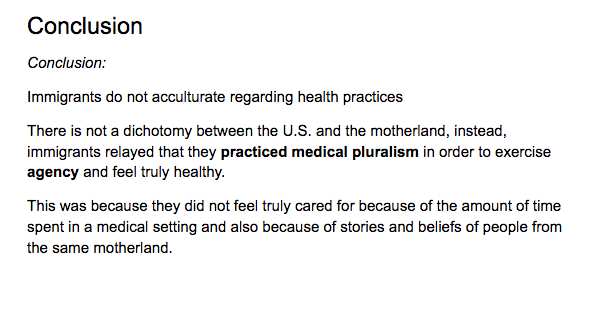The Importance of Care in Healthcare
Thank you Professor Kerner for nominating me to participate in this festival. My name is Christine, she/her/hers pronouns, and my senior year thesis incorporated what I have learned so far as a senior in my liberal arts degree in public health and anthropology with a minor in philosophy.
This thesis joined discourse about anthropology’s models of cultural competency and how its application feels from the perspective of immigrants.
My research question was: How do immigrants experience the U.S. healthcare system?
I interviewed 5 immigrants from Mexico, France (2), Columbia, and Guyana on how they have experienced the U.S. healthcare system.
I found that they practiced agency in employing medical pluralism because capitalist models of efficiency have lead them to feel uncared for. More specifically:
- The amount of care equates to the amount of time spent with medical personnel.
- “In labor, when you’re on the table, they leave you. But in home, I was never alone. I was talked to all the time. In the hospital, they come and look at you and walk out. That’s how I know they didn’t care” – Safiya, a Guyanese immigrant
- It is important in order to make sense of medicine in the U.S. from one’s own experience to that of immigrants from the same place.
- “They don’t do anything, in the hospitals, they don’t believe. It even happens when I go to the doctor and I ask him: ‘Doctor this is happening to me? What do you think?’ They run tests. Then I talk to neighbors, friends, and I tell them what was happening to me, [they tell me] ‘No, you can do this and you get okay’ And, yeah, it happens. They don’t go to doctors because they don’t believe in it. They [doctors] don’t believe in this, spearmint teas, they don’t believe.” – Maria, a Mexican immigrant
- Having information about a medical procedure can dispel myths about medicine or be able to describe the procedure to another person of their culture in a way that proves that they are not breaking any cultural norms.
- “I know that I have my womb.” – Safiya, who was able to explain her tubal figulation to another Guyanese women who didn’t approve
- “Oh my god, I was dying, it was too much for me.” – Maria, on refusing an epidural because she had believed that her back will hurt later in life. However, she didn’t express that concern with her doctor.
I concluded that immigrants do not acculturate their health practices. Immigrants practiced medical pluralism in order to exercise agency and feel truly healthy because they did not feel truly cared for by capitalist models of efficiency, mainly.
My biggest takeaway: There seems to be a lack of humanistic touch in medicine that is actually very important for people to experience so that they may share concerns and therefore receive more care. Continuing, there is a disconnect between doctors and especially their immigrant patients that needs to be bridged because it can be a matter of life or death.

-
Categories:
- Academic Festival